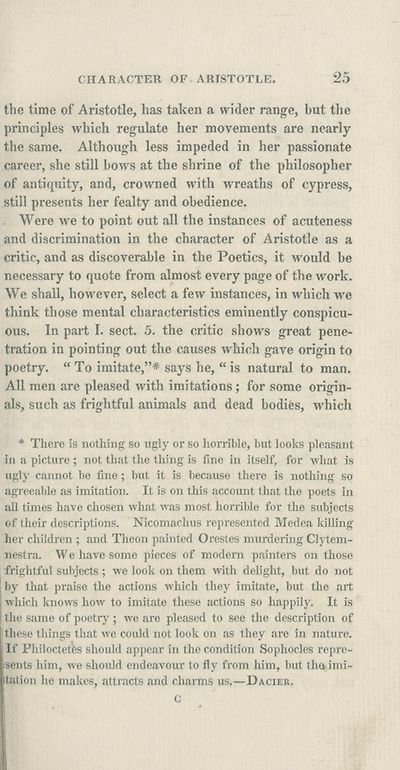Languages & literature > Athenaeum
(39)
Download files
Complete book:
Individual page:
Thumbnail gallery: Grid view | List view

CHARACTER OF ARISTOTLE.
25
the time of Aristotle, has taken a wider range, but the
principles which regulate her movements are nearly
the same. Although less impeded in her passionate
career, she still hows at the shrine of the philosopher
of antiquity, and, crowned with wreaths of cypress,
still presents her fealty and obedience.
Were we to point out all the instances of acuteness
and discrimination in the character of Aristotle as a
critic, and as discoverable in the Poetics, it would be
necessary to quote from almost every page of the work.
We shall, however, select a few instances, in which we
think those mental characteristics eminently conspicu¬
ous. In part I. sect. 5. the critic shows great pene¬
tration in pointing out the causes which gave origin to
poetry. “ To imitate,”# says he, “ is natural to man.
All men are pleased with imitations ; for some origin¬
als, such as frightful animals and dead bodies, which
* There is nothing so ugly or so horrible, but looks pleasant
in a picture ; not that the thing is fine in itself, for what is
ugly cannot be fine; but it is because there is nothing so
agreeable as imitation. It is on this account that the poets in
all times have chosen what was most horrible for the subjects
of their descriptions. Nicomachus represented Medea killing
her children ; and Theon painted Orestes murdering Clytem-
nestra. We have some pieces of modern painters on those
frightful subjects ; we look on them with delight, but do not
! by that praise the actions which they imitate, but the art
which knows how to imitate these actions so happily. It is
the same of poetry; we are pleased to see the description of
these things that we could not look on as they are in nature.
If Philoctetfes should appear in the condition Sophocles repre¬
sents him, we should endeavour to fly from him, but the imi-
itation he makes, attracts and charms us.—Dacier.
C
25
the time of Aristotle, has taken a wider range, but the
principles which regulate her movements are nearly
the same. Although less impeded in her passionate
career, she still hows at the shrine of the philosopher
of antiquity, and, crowned with wreaths of cypress,
still presents her fealty and obedience.
Were we to point out all the instances of acuteness
and discrimination in the character of Aristotle as a
critic, and as discoverable in the Poetics, it would be
necessary to quote from almost every page of the work.
We shall, however, select a few instances, in which we
think those mental characteristics eminently conspicu¬
ous. In part I. sect. 5. the critic shows great pene¬
tration in pointing out the causes which gave origin to
poetry. “ To imitate,”# says he, “ is natural to man.
All men are pleased with imitations ; for some origin¬
als, such as frightful animals and dead bodies, which
* There is nothing so ugly or so horrible, but looks pleasant
in a picture ; not that the thing is fine in itself, for what is
ugly cannot be fine; but it is because there is nothing so
agreeable as imitation. It is on this account that the poets in
all times have chosen what was most horrible for the subjects
of their descriptions. Nicomachus represented Medea killing
her children ; and Theon painted Orestes murdering Clytem-
nestra. We have some pieces of modern painters on those
frightful subjects ; we look on them with delight, but do not
! by that praise the actions which they imitate, but the art
which knows how to imitate these actions so happily. It is
the same of poetry; we are pleased to see the description of
these things that we could not look on as they are in nature.
If Philoctetfes should appear in the condition Sophocles repre¬
sents him, we should endeavour to fly from him, but the imi-
itation he makes, attracts and charms us.—Dacier.
C
Set display mode to:
![]() Universal Viewer |
Universal Viewer | ![]() Mirador |
Large image | Transcription
Mirador |
Large image | Transcription
| Antiquarian books of Scotland > Languages & literature > Athenaeum > (39) |
|---|
| Permanent URL | https://digital.nls.uk/108223551 |
|---|
| Description | Thousands of printed books from the Antiquarian Books of Scotland collection which dates from 1641 to the 1980s. The collection consists of 14,800 books which were published in Scotland or have a Scottish connection, e.g. through the author, printer or owner. Subjects covered include sport, education, diseases, adventure, occupations, Jacobites, politics and religion. Among the 29 languages represented are English, Gaelic, Italian, French, Russian and Swedish. |
|---|

